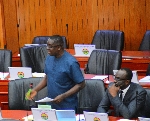Building cost inflation drops to 9.7% as Ghana records 5 consecutive monthly declines – GSS
 Housing financing
Housing financing
Ghana’s construction sector experienced a slowdown in cost pressures, as the Prime Building Cost Index (PBCI) declined to 9.7 per cent in September 2025, marking the fifth consecutive month of decline.
The latest figures, released by the Ghana Statistical Service (GSS) today, Friday, November 13, 2025, show a drop from August’s 12.0 per cent and represent a cumulative fall of 12.9 percentage points since December 2024.
According to the release, the PBCI for September stood at 131.7, up from 120.0 in the same month last year, reflecting the average increase in prices of building materials, labour and construction equipment.
On a month-on-month basis, the index dipped by 0.4 per cent, extending the trend of monthly declines that began in June 2025.
The Government Statistician, Alhassan Iddrisu (PhD), explained that the rebased PBCI now used 2023 as the reference year and incorporated expanded data covering 406 items across 23 sub-groups, collected from 489 outlets in 16 regions. The revised methodology also includes four new building models, covering both residential and non-residential structures.
Materials inflation eased from 11.1 per cent in August to 8.4 per cent in September, while labour inflation dropped marginally to 15.1 per cent. Plant inflation also slowed to 8.2 per cent.
Despite these declines, certain items remain significant inflation drivers, with steel recording the highest year-on-year inflation at 19.0 per cent, followed by equipment at 16.2 per cent and unskilled labour at 15.8 per cent.
The report also highlighted substantial price declines in some key inputs. Reinforcement registered the lowest inflation at minus 4.9 per cent, while cement posted a negative inflation rate of minus 1.3 per cent.
Month-on-month data showed widespread reductions across several sub-groups, with tiles, fine aggregates and electrical work experiencing some of the sharpest drops.
The statistical service noted that the stabilisation of costs presents a strategic window for households, businesses and government to adjust their planning and procurement decisions.
Households were encouraged to “build now, phase smartly” and prioritise local materials to cut expenses. Businesses were advised to lock in medium-term contracts while prices remain subdued.
For government, the GSS recommended targeted investment in local material production and expanded technical training to address persistent labour-related cost pressures. It further urged the state to use PBCI data to guide transparent procurement processes as infrastructure projects advance.
Source: classfmonline.com/Zita Okwang
Trending Business

Mahama commits $500m to expand oil palm as TCDA targets $12b export boost
01:17
Economist urges African nations to shift reserves from dollar assets to gold
01:03
GOLDBOD reminds licensees to submit monthly transaction reports
18:37
Stanbic Bank Ghana leads USD 205 million financing deal for Engineers & Planners
15:50
GIPC welcomes extension of Jubilee and TEN petroleum agreements to 2040
15:38
Energy Commission tightens oversight on electrical cable market
11:54
GFZA CEO leads management team on working visit to Bright Industrial Park Enterprises in Afienya
10:36
Gov't overhauls gold acquisition framework;Goldbod to lead new reserve strategy
07:25
National Homeownership Fund to host 2026 Homeownership Fair in Accra
06:53
Why rebrand Bawumia’s G-4-R policy and claim it is new? – Gideon Boako questions gov’t's motive
06:36




